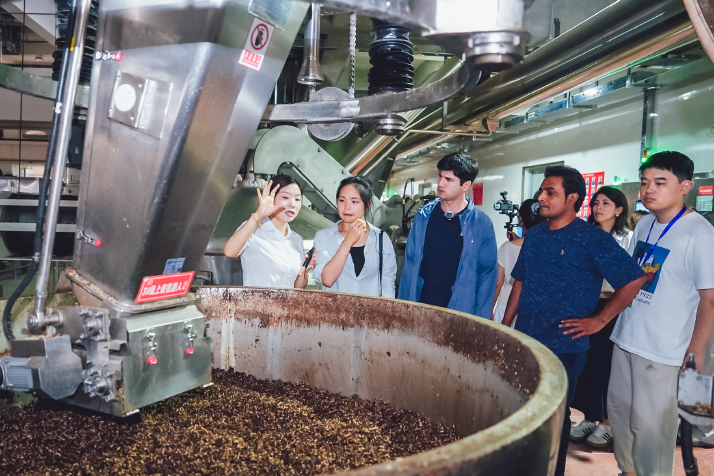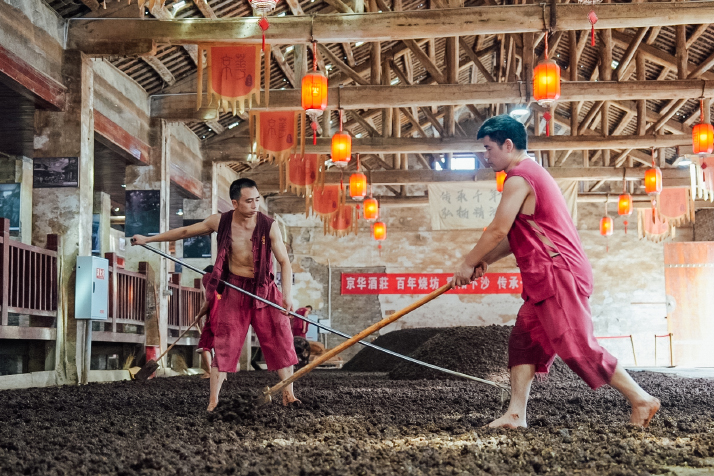| China |
| Calloused hands and dancing robotic arms work in sync in China's liquor heartland | |
|
|
 A staff member (first left) from Guotai Digital-Intelligence Liquor Group explains the smart brewing process to visitors in Maotai Town, Guizhou Province, on July 17 (COURTESY PHOTO)
Barefoot and dressed in a traditional Chinese vest, 26-year-old Yuan Teng moved across Jinghua Distillery's workshop floor in Maotai Town, Guizhou Province, on July 17. Rake in hand, he spread freshly steamed qu, the fermentation starter for China's famed sauce-flavor baijiu ("clear alcohol"), into even layers. Around him, five other workers mirrored his movements in the sweltering July heat. To honor centuries-old traditions and nurture the delicate microbial ecosystems crucial to fermentation, the distillery forbids modern comforts like air conditioning. At the room's center, two growing mounds of qu—one large, one small—awaited the freshly laid batches that will join them once cooled to perfection. This workshop stands as a preserved relic of China's distilling heritage. After Jinghua acquired the former state-owned facility in 2013, the distillery kept its soul intact: walls bearing original stains, exposed triangular roof beams and red lanterns dangling gently from the rafters. On July 17, the workshop welcomed diplomats and global youth visiting as part of Guizhou's China's Development: An Opportunity for a Colorful World International Exchange Week. Some guests even took up rakes to experience the ancient brewing process firsthand. The event, launched two days earlier in the city of Zunyi, invited participants to explore Guizhou's signature industries—including the brewing of sauce-flavor baijiu. Speaking at the opening ceremony,Du Zhanyuan, President of China International Communications Group, one of the organizers of the event, emphasized, "We hope diplomats and global youth will explore Zunyi extensively during this visit—witnessing firsthand the vigorous development of local specialty industries, sensing the vitality of Chinese modernization, and jointly discovering paths toward exchange, mutual learning and win-win cooperation."  The workshop of Jinghua Distillery in Maotai on July 17 (COURTESY PHOTO)
Liquor town The air in Maotai Town is thick with the sweet, pungent funk of fermentation. Dotting this valley are countless distilleries, where the art of liquor production traces back centuries. Located in the lowest basin of Guizhou Plateau, Maotai sits in an enclosed river valley where trapped heat lingers. Hemmed in by towering mountains along the Chishui River, the town has developed a unique microclimate. Summer brings five months of sweltering humidity and heat (35-39 degrees Celsius), creating an ideal cradle for microbial life. Millennia of uninterrupted brewing have cultivated a stable, distinctive microbial ecosystem—the bedrock of premium sauce-flavor baijiu. This rare geography and ancient craft make Maotai China's most renowned liquor-producing heartland. The Chishui River's waters and locally grown red-tassel sorghum forge irreplicable conditions for brewing, giving birth to the world-famous Moutai liquor. Founded by Moutai Distillery veterans Yuan Zhonghua (now over the age of 70) and qu-master Yan Yuequn, Jinghua Distillery maintains rigorous adherence to traditional methods. Yuan, once a master distiller at Moutai, still rises at 4 a.m. daily to oversee workshop operations, while workers follow the same predawn schedule. This rhythm blends ancestral wisdom with microbial science. "Dawn triggers peak microbial activity essential for fermentation," Yuan told Beijing Review. "Cooler mornings ease manual work, while afternoon heat, especially in summer, accelerates grain fermentation." This practice honors the sacred 12987 process—the gold standard for brewing premium sauce-flavor baijiu like Moutai. The numerals encode the complexity of the process: a one-year production cycle, two sorghum feeding rounds, nine steaming cycles, eight fermentation stages and seven distillation batches. Yet just kilometers away, at Guotai Digital-Intelligence Liquor Group, robotics redefine tradition. Automated arms dance ceaselessly in digitized workshops for the entire brewing process. In October 2023, Guotai crystallized this innovation through its Intelligent Brewing Standard System 2.0, deconstructing the 12987 method into 30 standardized processes. Take the essential grain-loading technique for example, traditionally, distillers layer fermented grains into steamers in batches, enabling full steam-grain contact. This three-phase thermal exchange reshapes compounds within the grains, yielding distinct base spirits across distillation rounds. The technique's precision directly impacts alcohol yield and quality. Historically, this required masters to combine acute vision with agile movement, anticipating steam patterns while distributing grains with swift, even motions. Such skill variation among workers led to inconsistent quality. Guotai's solution deploys two proprietary systems: a thermal detection system that uses infrared probes to monitor real-time grain-surface temperatures, and simultaneously, a morphology monitoring system that evaluates grain-spreading uniformity, feeding data back to robotic dispensers. Through 12 years of research and development that began in 2011, Guotai has transformed manual qu-treading into mechanized starter culture production, artisanal brewing into automated processes, and traditional storage into AI-managed digital aging. The company now holds the distinction of publishing China's first comprehensive smart-brewing standard for sauce-flavor baijiu. Arif Javaid, a Pakistani student studying in China, remarked after visiting Guotai, "Using AI-assisted machines, you achieve high accuracy and precision while enhancing production capacity and operational efficiency." From liquor to lifestyle Javaid was also amazed by the baijiu cocktails concocted by robots at Guotai's Smart Experience Center, which also produces liquor-infused ice cream and coffee. Meanwhile, the distillery's dome theater immerses visitors through motion-synchronized seats, taking them on a journey into the philosophical depths of China's brewing heritage and unique liquor culture. In recent years, major baijiu brands are pioneering cross-industry ventures, seeking for a shift from selling spirits to selling lifestyles, coming up with innovative products such as baijiu ice cream and sauce-flavor baijiu latte, a collaboration between Moutai and Luckin Coffee. Jinghua Distillery has attracted 20,000 visitors in 2024 alone through immersive experiences, from brewing workshops to mixology classes, gourmet dining to cultural stays. As one of Maotai's oldest distilleries, Hengchang Shaofang now fuses baijiu culture with contemporary art. It has recreated century-old Maotai streetscapes while exhibiting works by internationally acclaimed artists like Zhou Chunya and Zhang Xiaogang. Additionally, its newly built Hengchang Shaofang Intercontinental Hotel, developed in partnership with the luxury hospitality group, has entered trial operations, cementing its "art + distilling + hospitality" ecosystem. "Baijiu carries millennia of cultural DNA," Yan Kaijing, Chairman of Guotai, said at a forum on October 14 last year. "Its potential to integrate with diverse industries remains vast, particularly within cultural sectors where possibilities are boundless." (Reporting from Maotai, Guizhou Province) Copyedited by Elsbeth van Paridon Comments to yuanyuan@cicgamericas.com |
|
||||||||||||||||||||||||||||||
|